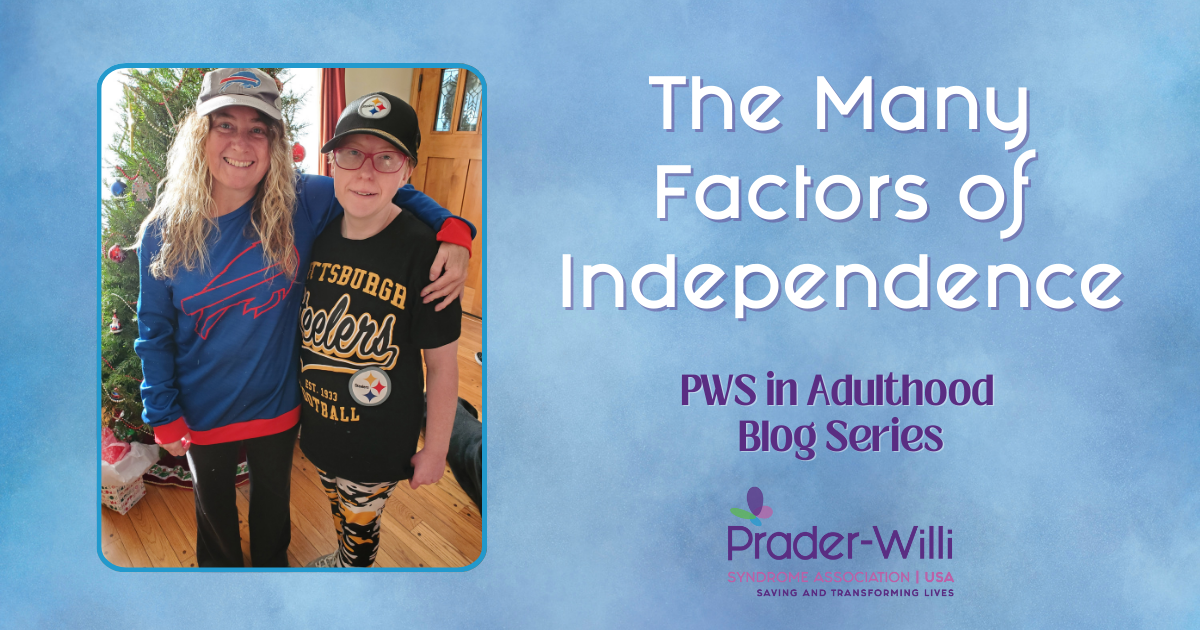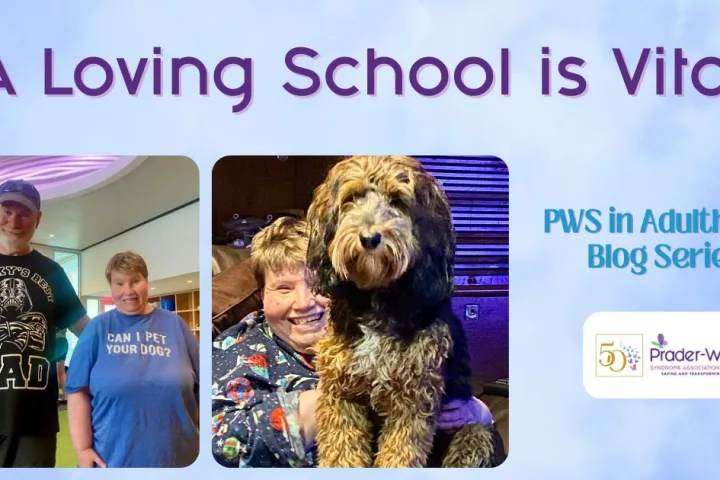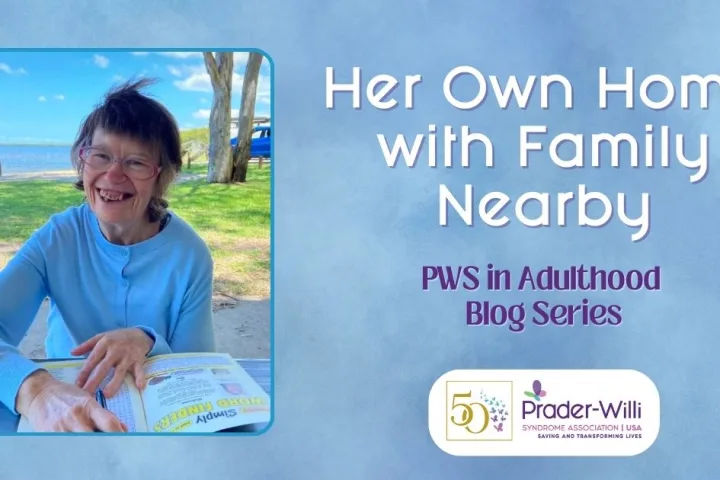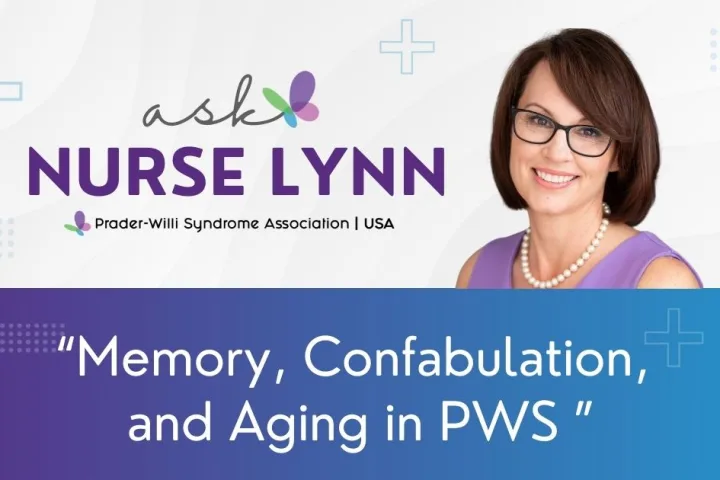contributed by Lynne Williams, mom to Jess, living with PWS
Hi! My daughter, who is 27 years-old, has uniparental disomy (UPD) PWS, and lives in a group home. I contemplated independent living for her, and it was a very difficult decision to make. As a parent, you want the best for your kids, and being as independent as possible was my goal for my daughter. So, I researched a bit, and learned that it would take so much effort, as the blog indicates, to coordinate all activities, transportation, and aides to ensure she lives independently; and I honestly did not have the bandwidth to do all that.
Another point I considered was my daughter’s mental capacity. Yes, she could probably live on her own, but she’s functioning at like a 6th grade level, and not sure if she would have the ability to make her own decisions as to what to do, where to go, who to be friends with, etc…..and maintain a budget! Knowing my daughter, as soon as she gets money, it’s gone in a matter of minutes on material things….no budget for food, for movies, for higher-priced items as she would not save money, she’d just spend it. She would need aides around the clock, and from what I’ve gained from previous experiences, aides have a very high turnover rate, so it was a constant battle to even find after-school care for her while I worked.
What steps did you take to prepare for their life as an adult?
My daughter went through the post-secondary educational program through a local community college which prepared them for working, taking the bus, and functioning in society. It was an awesome program! However, once that stopped, navigating day programs that were not ‘all day’ (as I worked full time) was challenging. The after-program care was problematic as it was inconsistent and not trained for PWS (especially in de-escalating situations). I recall one story, which was that my daughter came home from her program very tired and wanted to rest. The caregiver had directions from me to make sure she took the dog for a walk to get some exercise. Well, it ended up escalating to a point where the caregiver pressed charges against my daughter who hit her and only wanted to take a nap.
What does independence look like for them?
Her level of independence, in my opinion, is limited. She would not be able to do ANYTHING unsupervised. For example, when caregivers were either late or called out sick on occasion, my daughter would be home alone (cupboards all locked up), and go to the neighbors, or up to a local convenience store and beg for money or beg for food or pick the fruit off neighbor’s fruit trees. She is very sneaky and manipulative, so it is very difficult to be 100% independent.
What supports do they have in place?
Previously when she lived with me, we had her day program, and (not consistent) after program care. Once I got home, everything was fine. Now, she lives in a group home with all PWS girls, and it works. Sometimes, her and roommates argue, but they make up and get along. There is constant supervision, and she does go to a day program that she works at and does Special Olympic sports. They have a recreational and behavioral therapist that visit routinely as well.
Do they have romantic relationships and how are those maintained?
Yes, she has a boyfriend at her day program, and the staff try to keep an eye on them during the day. They don’t see each other outside the program. She had a different boyfriend previously, and I would try to support that. We’d go out for lunch or to a movie (with my chaperoning, of course) but no real alone time yet.
Do they work or volunteer in their community and what does that look like?
This was a big deal for me to ensure that my daughter was contributing to society somehow and integrating herself into the community. She was volunteering at a thrift store, which they really liked her, and now she works in the office of her day program shredding papers and vacuuming up the mess afterwards….and earning money! I think she’s completely capable of maintaining a ‘regular’ part time job where there’s no food around, like in a pet store or clothing store, or a library, etc. Something very routine, as she is happy doing it.
Do you have advice for parents on how and when to prepare for adulthood?
The system of post-secondary education, in my opinion, was a great help in transitioning to life after school; however, once she left that educational program, it was difficult navigating the many day programs available and to ensure that it would be a good fit for my daughter, due to food issues. We’ve gone through many day programs, and I feel that the community-based programs are the best in gaining a sense of independence in my daughter. Some day programs are, in my opinion, ‘babysitting’ organizations, which don’t really challenge my daughter to be the best she can be, so I wanted a more challenging environment to teach my daughter how to become more independent….taking the bus, out in the community dealing with other personalities, and managing her money.
Is your loved-one an adult with PWS?
- – What steps did you take to prepare for their life as an adult?
- – What does independence look like for them?
- – What supports do they have in place?
- – Do they have romantic relationships and how are those maintained?
- – Do they work or volunteer in their community and what does that look like?
- – Do you have advice for parents on how and when to prepare for adulthood?
Share your story for our PWS in Adulthood Blog series by emailing africke@pwsausa.org.
Share this!





 Jennifer Bolander has been serving as a Special Education Specialist for PWSA (USA) since October of 2015. She is a graduate of John Carroll University and lives in Ohio with her husband Brad and daughters Kate (17), and Sophia (13) who was born with PWS.
Jennifer Bolander has been serving as a Special Education Specialist for PWSA (USA) since October of 2015. She is a graduate of John Carroll University and lives in Ohio with her husband Brad and daughters Kate (17), and Sophia (13) who was born with PWS. Perry A. Zirkel has written more than 1,500 publications on various aspects of school law, with an emphasis on legal issues in special education. He writes a regular column for NAESP’s Principal magazine and NASP’s Communiqué newsletter, and he did so previously for Phi Delta Kappan and Teaching Exceptional Children.
Perry A. Zirkel has written more than 1,500 publications on various aspects of school law, with an emphasis on legal issues in special education. He writes a regular column for NAESP’s Principal magazine and NASP’s Communiqué newsletter, and he did so previously for Phi Delta Kappan and Teaching Exceptional Children. Evan has worked with the Prader-Willi Syndrome Association (USA) since 2007 primarily as a Crisis Intervention and Family Support Counselor. Evans works with parents and schools to foster strong collaborative relationships and appropriate educational environments for students with PWS.
Evan has worked with the Prader-Willi Syndrome Association (USA) since 2007 primarily as a Crisis Intervention and Family Support Counselor. Evans works with parents and schools to foster strong collaborative relationships and appropriate educational environments for students with PWS. Dr. Amy McTighe is the PWS Program Manager and Inpatient Teacher at the Center for Prader-Willi Syndrome at the Children’s Institute of Pittsburgh. She graduated from Duquesne University receiving her Bachelor’s and Master’s degree in Education with a focus on elementary education, special education, and language arts.
Dr. Amy McTighe is the PWS Program Manager and Inpatient Teacher at the Center for Prader-Willi Syndrome at the Children’s Institute of Pittsburgh. She graduated from Duquesne University receiving her Bachelor’s and Master’s degree in Education with a focus on elementary education, special education, and language arts. Staci Zimmerman works for Prader-Willi Syndrome Association of Colorado as an Individualized Education Program (IEP) consultant. Staci collaborates with the PWS multi-disciplinary clinic at the Children’s Hospital in Denver supporting families and school districts around the United States with their child’s Individual Educational Plan.
Staci Zimmerman works for Prader-Willi Syndrome Association of Colorado as an Individualized Education Program (IEP) consultant. Staci collaborates with the PWS multi-disciplinary clinic at the Children’s Hospital in Denver supporting families and school districts around the United States with their child’s Individual Educational Plan. Founded in 2001, SDLC is a non-profit legal services organization dedicated to protecting and advancing the legal rights of people with disabilities throughout the South. It partners with the Southern Poverty Law Center, Protection and Advocacy (P&A) programs, Legal Services Corporations (LSC) and disability organizations on major, systemic disability rights issues involving the Individuals with Disabilities Education Act (IDEA), Americans with Disabilities Act (ADA), and the federal Medicaid Act. Recently in November 2014, Jim retired.
Founded in 2001, SDLC is a non-profit legal services organization dedicated to protecting and advancing the legal rights of people with disabilities throughout the South. It partners with the Southern Poverty Law Center, Protection and Advocacy (P&A) programs, Legal Services Corporations (LSC) and disability organizations on major, systemic disability rights issues involving the Individuals with Disabilities Education Act (IDEA), Americans with Disabilities Act (ADA), and the federal Medicaid Act. Recently in November 2014, Jim retired.